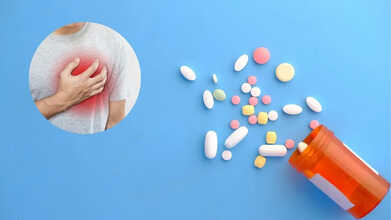- Health Conditions A-Z
- Health & Wellness
- Nutrition
- Fitness
- Health News
- Ayurveda
- Videos
- Medicine A-Z
- Parenting
- Web Stories
International Men's Day: Why ‘Winter Penis’ Should Be A Major Concern For Men

Winter Penis Condition (Credit-Canva)
International Men's Day is observed on the 19th of November and signifies the contribution of men and the support they provide worldwide. We use this opportunity to not only celebrate their work but also talk about topics that are usually not touched upon due to people feeling a sense of shame while speaking of it. But health is something we should not shy away from, instead help educate other people. As such there are a few things men should be aware of as we approach the cold season.
The winter season brings about many issues that you must take care of. Whether it is a cough, or cold keeping yourself bundled up and taking precautions from the cold will help you avoid many pesky issues. One such bizarre issue is a reduction in the size of a penis. In an interview with the Daily Mail, Dr Donald Grant who is a senior clinical advisor at the Independent Pharmacy explained how during winters, your body sends more blood supply to important organs and as such it can cause the size of a penis to shirk occasionally. He also mentioned how it can be worse for people who have erectile dysfunction.
Winter penis is a temporary condition that can affect men during cold weather. It occurs when the body's core temperature drops, causing blood vessels to constrict and reduce blood flow to the genitals. This can lead to a decrease in penis size and difficulty achieving or maintaining an erection. While it may sound alarming, the winter penis is a normal physiological response to cold temperatures and is usually harmless.
Why Does it Happen?
The human body is designed to maintain a stable core temperature and when the external temperature drops, the body initiates mechanisms to conserve heat. One such mechanism is vasoconstriction, where blood vessels narrow to reduce heat loss, this is also a physical phenomenon where heat expands and cold contracts. This process affects various parts of the body, including the genitals. As blood flow to the penis decreases, it can lead to shrinkage and impaired erectile function.
Winter penis can affect men of all ages. But for men with underlying health conditions, such as erectile dysfunction (ED), may be more affected by it. ED is a condition that signifies the inability to achieve or maintain an erection sufficient for sexual intercourse. The reduced blood flow caused by cold temperatures can exacerbate the symptoms of ED, making it more difficult to achieve and maintain an erection.
While the size of the penis may temporarily decrease during winter penis, it's important to remember that this is a normal physiological response. Once the body warms up, blood flow to the genitals will increase, and the penis will return to its normal size and function. It's essential to focus on overall sexual health and well-being, rather than fixating on temporary changes in size.
When Should One Seek Medical Advice?
While the size of the penis may temporarily decrease during winter penis, it's important to remember that this is a normal physiological response. Once the body warms up, blood flow to the genitals will increase, and the penis will return to its normal size and function. It's essential to focus on overall sexual health and well-being, rather than fixating on temporary changes in size. But if you are seeing something unusual even after the conditions mentioned above are met, then you should make sure to visit a healthcare professional.
You must make sure you are not confusing it with serious conditions like frostbite. Frostbite is when the tissue in your organ freezes and that can not only lead to damage but also potential loss of the organ as well. Layering and keeping yourself warm during winter is a very important thing. Dress in layers and eat food that will help you maintain a warm and stable body temperature. You should also exercise and consult a doctor if you believe there is something wrong with your body.
What Are Some Other Winter Conditions To Be Aware Of
Blood Clots
Cold weather can cause blood to thicken, increasing the risk of blood clots. Blood clots can lead to serious health problems like strokes and heart attacks. To reduce the risk of blood clots, it's important to stay warm, especially indoors.
Breathing Problems
Cold, dry air can irritate the airways, making it harder to breathe, especially for people with asthma or other respiratory conditions. It's important to keep warm and avoid breathing cold air, especially at night.
Lowered Immunity
Cold weather can weaken the immune system, making it harder to fight off infections. Spending more time indoors can increase the risk of spreading respiratory infections.
Back Pain
Cold weather can exacerbate back pain. Changes in barometric pressure and temperature can affect muscle tension and nerve sensitivity.
Seasonal Affective Disorder (SAD)
SAD is a type of depression that occurs during the winter months when there is less sunlight. Symptoms include fatigue, difficulty concentrating, and changes in appetite.
Common Painkiller Tramadol Found Ineffective For Chronic Pain, May Trigger THIS Serious Health Risk

Credits: Canva
Tramadol, a strong synthetic opioid, has been commonly prescribed for moderate to severe pain. However, a recent study suggests that its risks may outweigh its modest benefits for chronic pain, and its use should be carefully reconsidered. Published in the journal BMJ Evidence-Based Medicine, the study found that tramadol may offer only a slight reduction in chronic pain, with limited evidence supporting its effectiveness.
More worryingly, it could contribute to long-term health problems that might become life-threatening. Let’s examine the study’s findings in detail.
What Is Tramadol Used For?
Tramadol is a prescription, only synthetic opioid used to manage moderate to severe pain. It works by changing how the brain and nervous system perceive pain, according to Medline Plus. Its uses include:
- Acute pain: Immediate-release formulations help manage short-term, intense pain, such as after surgery or an injury.
- Chronic pain: Extended-release tablets and capsules are used for persistent, severe pain when other treatments have failed.
- Condition-specific pain: It may be prescribed for ongoing pain from conditions such as osteoarthritis, fibromyalgia, and neuropathic pain.
Tramadol Can Lead To Serious Health Issues?
A new review suggests that millions of Americans with chronic pain may be prescribed tramadol, a drug that may provide minimal relief. Even more concerning, the research highlights that the medication could increase the risk of serious health complications, including heart disease, the leading cause of death in the US.
According to the Centers for Disease Control and Prevention, about 51.6 million adults in the US, roughly one in five, experience chronic pain, with 17.1 million having pain that interferes with daily life or work. Tramadol has often been used to manage this pain, with 16 million prescriptions written for the drug in 2023 alone. Traditionally seen as a “safer alternative” to stronger opioids, tramadol has been perceived to carry fewer side effects and a lower risk of addiction.
Given conflicting evidence from earlier limited studies, Danish researchers decided to evaluate whether tramadol is truly effective and safe for chronic pain. “The findings suggest that the benefits of tramadol are questionable or uncertain. Additionally, there is evidence of potentially harmful effects,” said Dr. Janus Jakobsen, lead author and clinical professor at the University of Southern Denmark.
Tramadol Side Effects
Tramadol can cause serious side effects, including heart-related issues such as chest pain, heart disease, or congestive heart failure. The study also found it increased the risk of both mild and serious adverse events, including nausea, dizziness, constipation, drowsiness, and cardiac complications. It may also be linked to neoplasm events, abnormal cell growths that can lead to tumors, which may be benign or malignant.
These findings, published in BMJ Evidence-Based Medicine, arrive amid the ongoing opioid crisis in the US, which has claimed hundreds of thousands of lives since the late 1990s. Research indicates that around 12% of patients treated with opioids for chronic pain may develop addiction or misuse the drugs, raising the risk of overdose and other severe outcomes.
The opioid epidemic was declared a national public health emergency by President Trump in 2017, and the death toll has continued to rise in the years since.
10 Sleep Truth That May Be Holding You Back From Proper Rest, Sleep Doctor Reveal Harsh Sleep Truths

(Credit-Canva)
A major part of your health depends on your sleep. While you may delay your sleep or skip it to do other tasks, your body keeps the score. You may be slowly pushing yourself into not just physical health issues, but also mental health issues.
While sleep may seem like an easy thing, you only need enough time for there are many aspects of it that could reveal whether you are sleeping well or not. In a recent post, Dr Christopher J Allen, MD, a US board-certified sleep doctor, revealed 10 important sleep facts that one must know.
Sleep Advice You Need For Proper Rest
In the video titled, “Advice I’d give you as a sleep doctor for a decade – If I wasn’t afraid of hurting your feelings” he gave the below mentioned advice.
Snoozing Doesn't Help
Hitting the snooze button actually confuses your brain. It starts a new sleep cycle that you immediately interrupt. This guarantees you will feel more groggy and tired all morning, not rested. Just get up when the alarm first rings.
Late-Night Energy Isn't Natural
Feeling "wired" late at night isn't natural energy. It usually means you've had too much stimulation, you're dehydrated, and you're stuck in a constant stress cycle. Your body is running on high alert, not true fuel.
Instant Sleep Isn't Healthy
If you fall asleep the second your head hits the pillow, you don't have great sleep; you have a problem. It's a clear sign of severe exhaustion or a major sleep debt built up from missing sleep over time.
You Need Recovery, Not Stimulants
Your constant low energy can't be fixed by simply drinking more caffeine. Your real issue is a lack of proper recovery. You need more REM sleep—the deep, restorative kind—to truly solve your energy problem.
Midnight Waking Is Stress-Related
Waking up sharply at 3 AM is not random bad luck. It often happens because your stress hormones, called cortisol, start pumping during the night. Your body is on high alert, starting its "night shift" while you should be resting.
Scrolling Isn't Relaxing
You think you're relaxing when you scroll through your phone, but your nervous system disagrees. The bright screen and constant stimulation signal danger to your brain, putting you into survival mode instead of calming you down.
Weekend Catch-Up Doesn't Work
Trying to "catch up" on sleep during the weekend doesn't fix your sleep debt. It simply throws off your body's internal clock (circadian rhythm). This actually makes it much harder to wake up and start your week on Monday.
You Can't 'Get Used To' 5 Hours
Science shows that believing you are "used to" only five hours of sleep is dangerous. Your body is actually quietly suffering damage and breaking down. You need more sleep to avoid long-term health risks.
Tiredness Starts Before Bed
Waking up feeling completely exhausted isn't usually your mattress's fault. It’s often connected to your stress mindset, the food you eat, and those sneaky stress hormone spikes that happen while you should be deeply sleeping.
Most Important Factor For Sleep
The health expert ended the post by explaining your body can't truly heal and recover if you keep it in the same environment and under the same stress that makes you feel run down. Your bedroom and your nightly routine are actually a direct reflection of your entire lifestyle.
The core scientific truth is that your body isn't being lazy, it is genuinely exhausted, and your brain isn't broken, it's just begging for the safety and security that comes from good, proper rest.
Feeling Anxious Lately? Experts Reveal How It Might Be Affecting Your Blood Pressure

Credits: Canva
According to India’s National Mental Health Survey, nearly 3.5% of the country’s population experiences anxiety disorders each year, often triggered by work stress, relationship problems, or distressing events. While mild anxiety is a normal part of life, persistent or unmanaged anxiety can keep older adults in a constant state of tension.
This long-term stress may increase heart rate, affect mood, and, as experts now warn, even raise blood pressure (BP). The American Psychological Association (APA) defines anxiety as ongoing feelings of worry or unease that can cause physical reactions such as a faster heartbeat or sweating.
The APA also notes that anxiety can temporarily elevate blood pressure. In turn, people with chronic high blood pressure, or hypertension, may develop anxiety about their health, creating a cycle where each condition worsens the other.
Can Anxiety Lead To Blood Pressure?
Anxiety is the body’s built-in response to stress. It’s common to feel anxious before a major exam or while awaiting important news. When this happens, the body releases stress hormones that raise the heart rate and narrow blood vessels, both of which can push blood pressure higher.
A 2015 study by Medical News Today found that individuals with severe anxiety faced a greater risk of developing hypertension compared to those with milder symptoms. Researchers emphasized the importance of early diagnosis and treatment of anxiety, especially for people who already have high blood pressure.
In most cases, anxiety-related spikes in blood pressure are short-lived and return to normal once the person calms down. However, constant anxiety can strain the heart, kidneys, and blood vessels much like long-term hypertension does. Over time, hormonal changes linked to anxiety may lead to fat accumulation, especially around the waist. Anxiety can also alter daily habits, such as causing stress eating, which may indirectly raise blood pressure.
Signs of Anxiety-Induced High Blood Pressure
A normal blood pressure reading typically falls between 90/60 mmHg and 120/80 mmHg. For adults over 80, readings below 150/90 mmHg are considered healthy. When readings consistently rise above these levels, it can indicate hypertension. Some anxiety medications can also increase blood pressure. For example, serotonin and noradrenaline reuptake inhibitors (SNRIs), commonly used to treat anxiety disorders, are known to cause a rise in BP. Common symptoms of anxiety that may contribute to higher blood pressure include:
- Trembling or shaking
- Excessive sweating
- Chest pain
- Headaches
- Nausea or stomach discomfort
- Irritability
- Dizziness or shortness of breath
Can High Blood Pressure Also Trigger Anxiety?
High blood pressure itself can sometimes lead to feelings of anxiety. People diagnosed with hypertension may start worrying about their long-term health or potential complications. The symptoms of hypertension, such as headaches, vision problems, or an irregular heartbeat can also cause distress or panic. According to Medical News Today, signs of hypertension can include:
- Vision changes
- Headaches
- Irregular heart rhythm
- Buzzing in the ears
Severe hypertension can also provoke anxiety. If someone feels unusually anxious and experiences symptoms like headaches or shortness of breath, it is important to seek immediate medical help.
Since hypertension often develops without clear warning signs, it can be difficult to tell whether the cause of discomfort is anxiety or high blood pressure. This is why regular check-ups with a doctor are essential for monitoring and managing both conditions effectively.
© 2024 Bennett, Coleman & Company Limited

